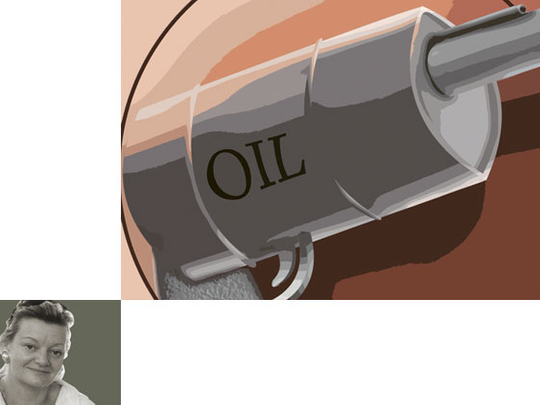
Saudi Arabia and neighbouring oil-producing Gulf countries wield massive clout. If they so choose, together with Iraq, they can hold world economies to ransom by either reducing production to a trickle, selecting their customers or sealing the Strait of Hormuz.
Moreover, imagine a scenario whereby Opec, that controls 79 per cent of the planet’s crude oil reserves, became politicised and placed itself under the umbrella of China, Russia — or both. In that event, its members — Algeria, Angola, Ecuador, Iran, Iraq, Kuwait, Libya, Nigeria, Qatar, Saudi Arabia and Venezuela — would be greatly empowered to solve issues close to the hearts of all those countries, such as the formation of a Palestinian state. This might sound outlandish but it’s exactly the state of play that the US and its European allies fear the most.
There’s a precedent. In response to Washington’s decision to supply weapons to Israel during the 1973 War, Opec’s Arab members partnered with Egypt, Syria and Tunisia launched an oil embargo to twist the Nixon administration’s arm to pressure Israel to give up occupied Arab land. Supplies to the US ‘the principal hostile country’ were cut off entirely. The move shocked global markets and prompted lingering worldwide inflation. Oil prices quadrupled within a year.
Even America’s man, the Shah, was gung-ho telling the New York Times, “Of course [the world price of oil] is going to rise…You [Western nations] increased the price of wheat you sell us by 300 per cent and the same for sugar and cement...; You buy our crude oil and sell it back to us, refined as petrochemicals, at a hundred times the price you’ve paid to us... It’s only fair that, from now on, you should pay more for oil. Let’s say 10 times more.”
But, in the event today’s oil producers were to flex their muscle bringing the West to its knees, the potential for a Third World War would rise exponentially. It’s no coincidence that the US and its allies haven’t flinched from intervening militarily in oil-producing countries under various pretexts while, according to the neoconservative manifesto signed-up to by numerous Bush administration figures, there were several other oil-producing nations on the ‘New American Century’s’ hit-list. (And, by the way, don’t think those hawkish neocons are out of the picture; they’re currently hanging on the coattails of front-running Republican wannabe presidents Mitt Romney and Newt Gingrich as advisers).
Since 1973, Opec has refrained from using the oil card for political purposes. In 2002, Saudi foreign policy adviser Adel Al Jubeir said “Oil is not a weapon. Oil is not a tank”; in 2009, when Israel was mercilessly hammering the Gaza Strip, the Saudi Foreign Minister ruled out using oil to end the conflict saying, “Oil is not a weapon. You can’t reverse a conflict by using oil.” Indeed, there seems to be a general consensus among Arab oil producers that as guardians of much of the world’s supplies they have an ethical responsibility not to use oil as a tool of manipulation.
There is a moral argument, therefore, for saying that oil should not be used as a weapon in an attempt to bring Iran to heel. There are also a number of practical arguments why this is a bad idea. In the first place, it simply won’t work; those imposing the sanctions on Iran’s oil industry/exports — the US and the EU — have more to lose than Iran when their economies are struggling to stave off recession and when Iran’s major customers, such as Beijing and New Delhi, have no intention of following suit.
Indeed, India plans to circumvent sanctions on Iranian banks by paying for its oil in gold bricks. Turkey’s Foreign Minister Ahmet Davotoglu has condemned the EU decision and says Ankara will not institute anti-Iranian sanctions without a UN Security Council resolution, which is unlikely to manifest itself due to objections from veto-holding China and Russia.
Some analysts believe China and Russia will ultimately cave in, but Russia is showing a different face today from that of the last decade when it reluctantly went along with the White House on Afghanistan and Iraq.
In recent days, Russia’s Prime Minister Vladimir Putin has accused the US of hegemonic ambitions saying, the US “wants to control everything...sometimes I have the impression that the United States does not need allies, that it needs vassals.” This time, Moscow may be up for a fight to protect its own economic interests and expand its sphere of influence. It’s significant that Russia is standing firm with Syria’s Bashar Al Assad. Earlier this month three Russian warships and an anti-submarine vessel paid a six-day visit to a Syrian port. Russia continues to supply Syria with weapons and has just signed a deal to deliver 36 combat jets to Damascus. Russia is just as protective of Iran with which it enjoys lucrative cooperation.
Tehran has also crossed the line by threatening to set fire to Gulf oil fields in the event it comes under attack and, most importantly, to close the Strait of Hormuz to shipping so, you could say, that it has virtually invited retaliation in kind. Oil should not be a weapon, but if the US, the EU and Iran have changed the rules then perhaps it’s time that Arab oil-producing states to get on with the programme to compete in this increasingly dirty and dangerous game.
Linda S. Heard is a specialist writer on Middle East affairs. She can be contacted at lheard@gulfnews.com. Some of the comments may be considered for publication.










